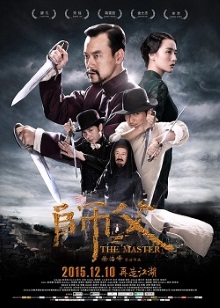
So our regular cinephile friend had nothing but high praise for this little known Chinese film, making it a must watch. Unfortunately finding a copy of it anywhere proved almost impossible and I had to eventually get it from that same friend. When I finally sat down to watch it, I found it abstruse with its highly abbreviated Chinese speech almost indecipherable. Even my wife ended up giving up on understanding it. I eventually had to look up the plot on Wikipedia to work everything out.
Chen, a grandmaster of Wing Chun, arrives in the city of Tianjin with the intent of founding his school and teaching his martial art which is on the verge of extinction. He impresses one the city’s preeminent grandmasters Zheng who advises him in order to do so he must first defeat champions from eight of the existing schools. However he is also warned that doing so would result in him being driven out of the city. They therefore hatch a plan for Chen to train up a disciple from scratch and have him defeat the other schools to enhance the reputation of Chen’s Wing Chun style. The disciple will then be sacrificed by being forced to leave town and Chen will be free to open a school. Zheng offers a disciple of his for this purpose but Chen finds one of his own, Geng, from among the coolies. Chen also marries a local woman who has fallen into disgrace, apparently as part of his cover. At first things go well as Geng turns out to be extremely talented. But the plans runs against the ambitions of Madame Zhou, the head of another school, who wishes to take control of the city’s martial arts community, and the ruthless Lin, one of Zheng’s former disciples.
This profusion of characters and intersecting plotlines doesn’t make the film any easier to understand. Like some other Chinese films we’ve watched, The Final Master has a very stylized presentation with dialogue that is so sparse and unnatural that it’s very difficult to make out the true motivations of the various characters. For example, I found it impossible to have much emotional investment in the relationship between Chen and his wife when their interactions are so cloaked in mystery. When they first marry, he asks her that she never question what their true purpose in Tianjin is and she demands of him that he takes her window shopping without buying anything once a month and eat crabs. I’d feel tempted to treat this as some sort of surreal comedy if it weren’t for the fact that everyone here seems to be perfectly serious. This is exacerbated by the frankly illogical rules of the martial arts community, their conception of honor and face and the characters’ convoluted plans to work around them. As I’ve mentioned before, I just can’t suspend my disbelief when it comes to these ridiculous setups.
Still, there’s no denying that the photography and succinctness of the scenes creates a very distinctive mood. The cadences of the characters’ dialogue and how they tend to be elegant without being edgy contributes to this feeling like a true martial arts epic. The crown to top it all off is that the fight choreography is an absolute joy to watch. They can look a little underwhelming at first glance but that’s because of how realistic they are made to look. There is minimal use of fancy camera angles to play up the drama, no special effects or wire-fu. Instead everything looks authentic, like they happen in real-time and are the result of genuine skill and precision. Chen isn’t superhuman but he does come across as a true martial arts master. I even love how the masters of various schools trot out a succession of ever more exotic weapons with which to challenge Chen. This might look ridiculous if done by a lesser director but Xu Haofeng, a director I’ve never heard of before this, has no problem making this look fantastic.
Apart from this, The Final Master also does a few other things that I think are pretty interesting. I’ve ragged on the Ip Man films plenty of times before for their hamfisted putdowns on foreigners. This film indulges in a bit of that too but in much smarter and tasteful manner. When the camera first switches from an interior view to a street level view of Tianjin, the very first thing we see are pedestrians hurrying about and every single one of them is a Caucasian, subtly implying that they are the hoi polloi. When Zheng takes Chen to a place to relax, it turns out to be cabaret where all the performers are Caucasians women in skimpy clothes. It’s a form of denigration that is all the more effective for being a light touch. Something else that the film does is reinforce how Chen is a true master in that he applies just the right amount of force to an opponent to put him down and no more. Again, technique and precision rule the day in the fight scenes here, not brute force, and I believe that one of the film’s themes is that he is able to achieve such a degree of mastery due to his temperament and moral character.
Unfortunately while this is indeed a very interesting film, on balance its flaws, namely the incomprehensibility of its plot, what I perceive to be unearned pretentiousness and characters that I just can’t develop any feelings for, prevent this from being a solid recommendation. At best, those interested might want to check out its fight scenes and I’d certainly want to pay this director some attention in the future.